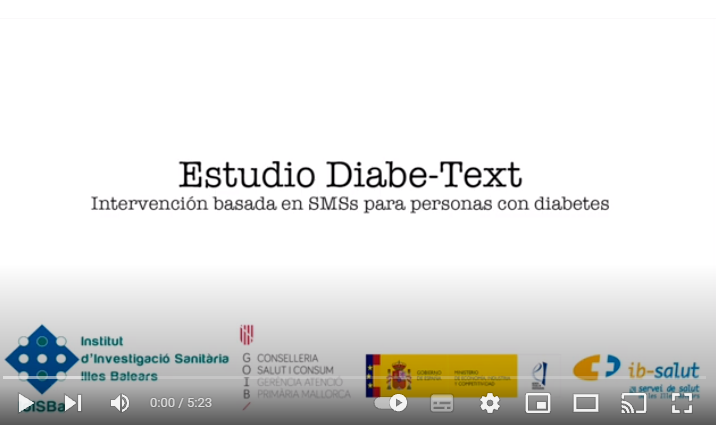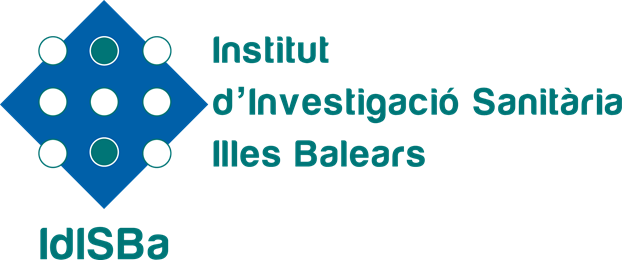Diabetes: a global emergency
537 million adults worldwide live with diabetes. In Spain, one in 10 adults has diabetes. Nearly half of them have not been diagnosed.
DiabeText
The DiabeText tool aims to help people prevent diabetes and the complications caused by this disease.
Interested in using DiabeText?
We encourage researchers, managers, and healthcare centers to use DiabeText. Contact us through the following form, and we will explain how you can access and start using the tool.
What does the DiabeText tool consist of?
The DiabeText tool consists of sending short text messages (SMS) to people with type 2 diabetes or at high risk of developing the disease. The text messages are personalized based on the information available in the electronic medical record, as well as the lifestyle of the individuals receiving them.
Through these text messages, the aim is to promote the adoption of healthy lifestyles, as well as the proper use of medication – key aspects for the prevention and treatment of diabetes.
How was the DiabeText tool developed?
The DiabeText tool has been developed through a multi-stage process involving a large multidisciplinary team. The development of this tool is based on the framework for developing complex interventions proposed by the Medical Research Council.
1. Reviewing the literature.

Review of scientific literature.
First, we conducted a series of systematic literature reviews and meta-analyses to gain a deeper understanding of the characteristics of similar tools that have successfully worked in other countries or with individuals facing health issues similar to diabetes.
2. Involving patients and healthcare professionals

Focus groups with patients and healthcare professionals
We have conducted more than ten focus groups with both individuals with type 2 diabetes or at risk of developing it, as well as healthcare professionals. We have listened to and thoroughly analyzed their views, advice, and suggestions on how DiabeText should be tailored to meet the needs of both patients and healthcare professionals.
3. Developing the text messages.

Developing a text message library.
Taking into account the results of the previous two phases, we have designed a library of around 1000 text messages. The messages were created by a multidisciplinary team, led by health psychologists, including doctors, nurses, physical activity experts, pharmacists, and, of course, patients. Through a complex process, we have refined the messages. We have also established different profiles or patient groups and determined which messages and in what order they should be sent for each profile.
4. Developing the technology.

Integration of the message library with electronic health records.
Working together with the Health Service of the Balearic Islands, as well as with the Research Platform on Health Information at IdISBa, we have developed a technological solution that allows for the personalization of text messages based on the patients’ electronic health record data. This enables us to send personalized messages to patients based on their medication type, level of physical inactivity, body mass index, or whether they suffer from specific complications such as diabetic retinopathy, diabetic foot, renal failure, dyslipidemia, or cholesterol. It also allows us to send messages about new medications available for pick-up at the pharmacy, results from recent lab tests, or reminders of upcoming appointments.
Evaluation of DiabeText through clinical trials

In order to scientifically determine the effect of the DiabeText tool, we carry out various non-commercial clinical trials. DiabeText is currently being evaluated in four clinical trials.
What do patients who have already used DiabeText think?

DiabeText has already been used in more than 130 patients, who have participated in various research studies aimed at evaluating this tool. We have interviewed some of these patients, who point out that this tool encourages:
- Greater awareness about the disease, often silent and forgotten
- Motivation to make behavioral changes toward healthier lifestyles
- The feeling of accompaniment and support
- Greater knowledge of diabetes and how to address it
“The messages have helped me analyze my behavior, reflect and rectify if necessary“. ( (Woman with type 2 diabetes, 56 years old)
Do you want to know more about DiabeText user experiences? click below!
Scientific publications about DiabeText

- Zamanillo-Campos R, Fiol deRoque MA, Serrano-Ripoll MJ, Mira-Martínez S, Ricci-Cabello I. Development and evaluation of DiabeText, a personalized mHealth intervention to support medication adherence and lifestyle change behaviour in patients with type 2 diabetes in Spain: A mixed-methods phase II pragmatic randomized controlled clinical trial. Int J Med Inform. 2023;176:105103.
- Zamanillo-Campos R, Serrano-Ripoll MJ, Taltavull-Aparicio JM, Gervilla-García E, Ripoll J, Fiol-deRoque MA, Boylan AM, Ricci-Cabello I. Perspectives and Views of Primary Care Professionals Regarding DiabeText, a New mHealth Intervention to Support Adherence to Antidiabetic Medication in Spain: A Qualitative Study. Int J Environ Res Public Health. 2022 Apr 1;19(7):4237. doi: 10.3390/ijerph19074237.
- Zamanillo-Campos R, Serrano-Ripoll MJ, Taltavull-Aparicio JM, Gervilla-García E, Ripoll J, Fiol-deRoque MA, Boylan AM, Ricci-Cabello I. Patients’ Views on the Design of DiabeText, a New mHealth Intervention to Improve Adherence to Oral Antidiabetes Medication in Spain: A Qualitative Study. Int J Environ Res Public Health. 2022 Feb 8;19(3):1902. doi: 10.3390/ijerph19031902.
- Abbate M, Fresneda S, Yañez A, Ricci-Cabello I, Galmes-Panades AM, Aguilo A, Bennasar-Veny M; PREDIPHONE trial group. Nurse-led telephone intervention for lifestyle changes on glycaemic control in people with prediabetes: Study protocol for a randomized controlled trial. J Adv Nurs. 2021 Jul;77(7):3204-3217. doi: 10.1111/jan.14842. Epub 2021 Mar 26.
- Prinjha S, Ricci-Cabello I, Newhouse N, Farmer A. British South Asian Patients’ Perspectives on the Relevance and Acceptability of Mobile Health Text Messaging to Support Medication Adherence for Type 2 Diabetes: Qualitative Study. JMIR Mhealth Uhealth. 2020 Apr 20;8(4):e15789. doi: 10.2196/15789.
- Ricci-Cabello I, Bobrow K, Islam SMS, Chow CK, Maddison R, Whittaker R, Farmer AJ. Examining Development Processes for Text Messaging Interventions to Prevent Cardiovascular Disease: Systematic Literature Review. JMIR Mhealth Uhealth. 2019 Mar 29;7(3):e12191. doi: 10.2196/12191.
- Farmer AJ, McSharry J, Rowbotham S, McGowan L, Ricci-Cabello I, French DP. Effects of interventions promoting monitoring of medication use and brief messaging on medication adherence for people with Type 2 diabetes: a systematic review of randomized trials. Diabet Med. 2016 May;33(5):565-79. doi: 10.1111/dme.12987. Epub 2015 Nov 17.
- Arambepola C, Ricci-Cabello I, Manikavasagam P, Roberts N, French DP, Farmer A. The Impact of Automated Brief Messages Promoting Lifestyle Changes Delivered Via Mobile Devices to People with Type 2 Diabetes: A Systematic Literature Review and Meta-Analysis of Controlled Trials. J Med Internet Res. 2016 Apr 19;18(4):e86. doi: 10.2196/jmir.5425.
Funding Institutions

DiabeText has been developed thanks to the support of various national and regional funding agencies.
- Promoting the transfer of DiabeText, a digital tool integrated with medical history to improve the health and quality of life of people with diabetes (PDC2022-133257-I00)
Call for “Concept Tests 2022” (Ministry of Science and Innovation)
Principal investigator: Ignacio Ricci Cabello
Duration: 2023 – 2024 - Development and evaluation of a low intensity, multifaceted, digital health intervention to prevent type 2 diabetes mellitus in the primary care setting: the PREDIABETEXT study (SYN20/04)
Synergia Program 2020. IdISBa.
Principal Investigators: Ignacio Ricci Cabello and Escarlata Angullo Martínez.
Duration: 2021 – 2022. - Promoting Adherence to Antidiabetic Medication in Patients with Type 2 Diabetes Through a Mobile Technology System Integrated with Electronic Health Records (RTI2018-096935-A-I00)
R&D&I Projects “Research Challenges.” Ministry of Science, Innovation, and Universities.
Principal Investigator: Ignacio Ricci Cabello.
Duration: 2019 – 2022. - Effectiveness and cost-utility of a nursing intervention based on social prescription of assets and lifestyle modification to reduce blood glucose in prediabetics (PREDIAPS) (PI18/01209)
Instituto de Salud Carlos III, “Strategic Action in Health 2018”.
Principal investigator: Miguel Bennàsar Veny.
Duration: 2019 – 2021.
Interested in using DiabeText?

We encourage researchers, managers, and healthcare centers to use DiabeText. Contact us through the following form, and we will explain how you can access and start using the tool.




